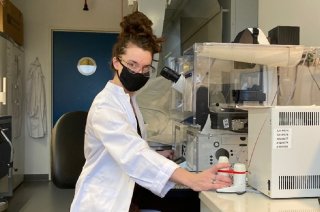
PhD project
Project 11 Exploring nutritional adaptation of host-specific and generalist insect-pathogenic fungi (DK)
Natural host range, or the number of species a parasite is capable of infecting, varies considerably among insect-pathogenic fungi (IPF). The factors driving why some IPF are capable of infecting a large range of insects while others are limited to specific hosts is not well understood in the field of evolutionary ecology. My project will explore how key abiotic factors relate to host specificity using Metarhizium, a common rhizospheric entomopathogenic fungus and plant symbiont, and its insect host, mealworm (Tenebrio molitor) beetles.
Environmental conditions and fungal characteristics such as nutritional acquisition, temperature optima, and response to short-term temperature stress all influence the evolution of host adaption in IPF. I will use three Metarhizium species and Tenebrio beetles as model organisms to examine the effects of temperature and nutrition on the growth of fungal species that have evolved different host ranges. Tenebrio are serious pests of stored grain products in many areas of the world but their larvae, mealworms, are also mass-produced for the food and feed industry. Metarhizium is an ideal model system for answering basic questions in ecology and speciation. As a genus, it has species that are globally distributed, lots of genomic resources have been established, and most importantly, Metarhizium species have very diverse host ranges. In my project, the diverging host ranges between these fungi will be studied in vivo and in vitro to determine thermal optima, optimal nutritional intake, and explore interactions between fungal diet quality, temperature, and virulence.
What makes this cryptic evolutionary phenomenon relevant? IPF are an important aspect of population control in natural insect populations. IPF are also relatively understudied. It’s estimated the biodiversity of IPF likely harbors one of the largest reservoirs of undocumented fungal species. Understanding the evolutionary relationship between IPF and insects is increasingly more important as insects has become a key source of protein massively produced for livestock and human consumption.
My work will be carried out in three phases and conducted primarily at the University of Copenhagen, as well as the University of Leeds and the UK Centre for Ecology & Hydrology. First, I will develop a somewhat novel approach to rapidly measuring fungal growth with spectrophotometry in small volume liquid media. This method will then be applied in an in vitro analysis to determine thermal and nutritional optima in three species of Metarhizium, which differ in their host specificity. Findings from the in vitro experiment will serve as a basis for the parameters of in-vivo experiments with live T. molitor. Conclusions drawn from the live insect model are intended to be used to discern the relationship between the evolution of host specificity and key abiotic factors, as well as make informed predictions for favorable insect production conditions to avoid fungal infections in the mass rearing industry.
